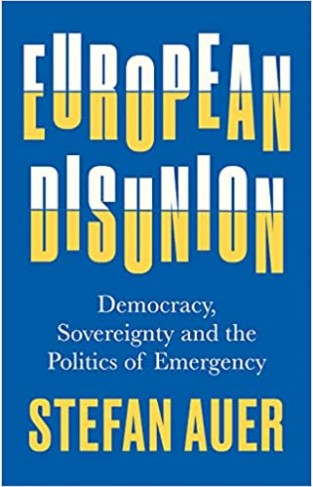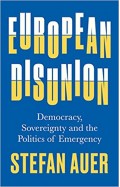European Disunion: Democracy, Sovereignty and the Politics of Emergency
By: Stefan Auer
-
Rs 4,547.50
- Rs 9,095.00
- 50%
You save Rs 4,547.50.
Due to constant currency fluctuation, prices are subject to change with or without notice.
The European Union means many different things to its many peoples. In Germany, for example, the European project was conceived mainly as post-national, or even post-sovereign. In France, by contrast, President Emmanuel Macron has pursued the vision of a sovereign Europe; that is, an EU that would become a formidable geopolitical actor. Yet, instead, Europe has struggled to ascertain its values abroad and even domestically, facing a sovereignist rebellion from its newer member states, such as Hungary and Poland, and the departure of Britain. The eurozone crisis has undermined the EU's economic credentials, the refugee crisis its societal cohesion, the failure to stand up to Russia its sense of purpose, and the Covid-19 pandemic its credibility as a protector of European citizens. The key argument of this book is that the multiple crises of the European project are caused by one underlying factor: its bold attempt to overcome the age of nation-states. Left unchecked, supranational institutions tend to become ever more bureaucratic, eluding control of the people they are meant to serve. The logic of technocracy is thus pitted against the democratic impulse, which the European Union is supposed to embody. Democracy in Europe has suffered as a result.
The European Union means many different things to its many peoples. In Germany, for example, the European project was conceived mainly as post-national, or even post-sovereign. In France, by contrast, President Emmanuel Macron has pursued the vision of a sovereign Europe; that is, an EU that would become a formidable geopolitical actor. Yet, instead, Europe has struggled to ascertain its values abroad and even domestically, facing a sovereignist rebellion from its newer member states, such as Hungary and Poland, and the departure of Britain. The eurozone crisis has undermined the EU's economic credentials, the refugee crisis its societal cohesion, the failure to stand up to Russia its sense of purpose, and the Covid-19 pandemic its credibility as a protector of European citizens. The key argument of this book is that the multiple crises of the European project are caused by one underlying factor: its bold attempt to overcome the age of nation-states. Left unchecked, supranational institutions tend to become ever more bureaucratic, eluding control of the people they are meant to serve. The logic of technocracy is thus pitted against the democratic impulse, which the European Union is supposed to embody. Democracy in Europe has suffered as a result.
European Disunion: Democracy, Sovereignty and the Politics of Emergency
By: Stefan Auer
Rs 4,547.50 Rs 9,095.00 Ex Tax :Rs 4,547.50
Zubin Mehta: A Musical Journey (An Authorized Biography)
By: VOID - Bakhtiar K. Dadabhoy
Rs 892.50 Rs 1,050.00 Ex Tax :Rs 892.50
The Origins of Political Order From Prehuman Times to the French RevolutioN
By: Francis Fukuyama
Rs 4,045.50 Rs 4,495.00 Ex Tax :Rs 4,045.50
Reset: How This Crisis Can Restore Our Values and Renew America
By: Kurt Andersen
Rs 450.00 Rs 500.00 Ex Tax :Rs 450.00
How To Win A Cosmic War God Globalization And The End Of War
By: Reza Aslan
Rs 625.50 Rs 695.00 Ex Tax :Rs 625.50
Game Change Obama And The Clintons McCain And Palin And The Race Of A Lifetime
By: John Heilemann
Rs 715.50 Rs 795.00 Ex Tax :Rs 715.50
Made to Stick: Why Some Ideas Take Hold and Others Come Unstuck
By: Chip Heath & Dan Heath
Rs 2,695.50 Rs 2,995.00 Ex Tax :Rs 2,695.50
No similar books from this author available at the moment.
No recently viewed books available at the moment.
Zubin Mehta: A Musical Journey (An Authorized Biography)
By: VOID - Bakhtiar K. Dadabhoy
Rs 892.50 Rs 1,050.00 Ex Tax :Rs 892.50
European Disunion: Democracy, Sovereignty and the Politics of Emergency
By: Stefan Auer
Rs 4,547.50 Rs 9,095.00 Ex Tax :Rs 4,547.50














-120x187.jpg?q6)





-120x187.jpg?q6)







